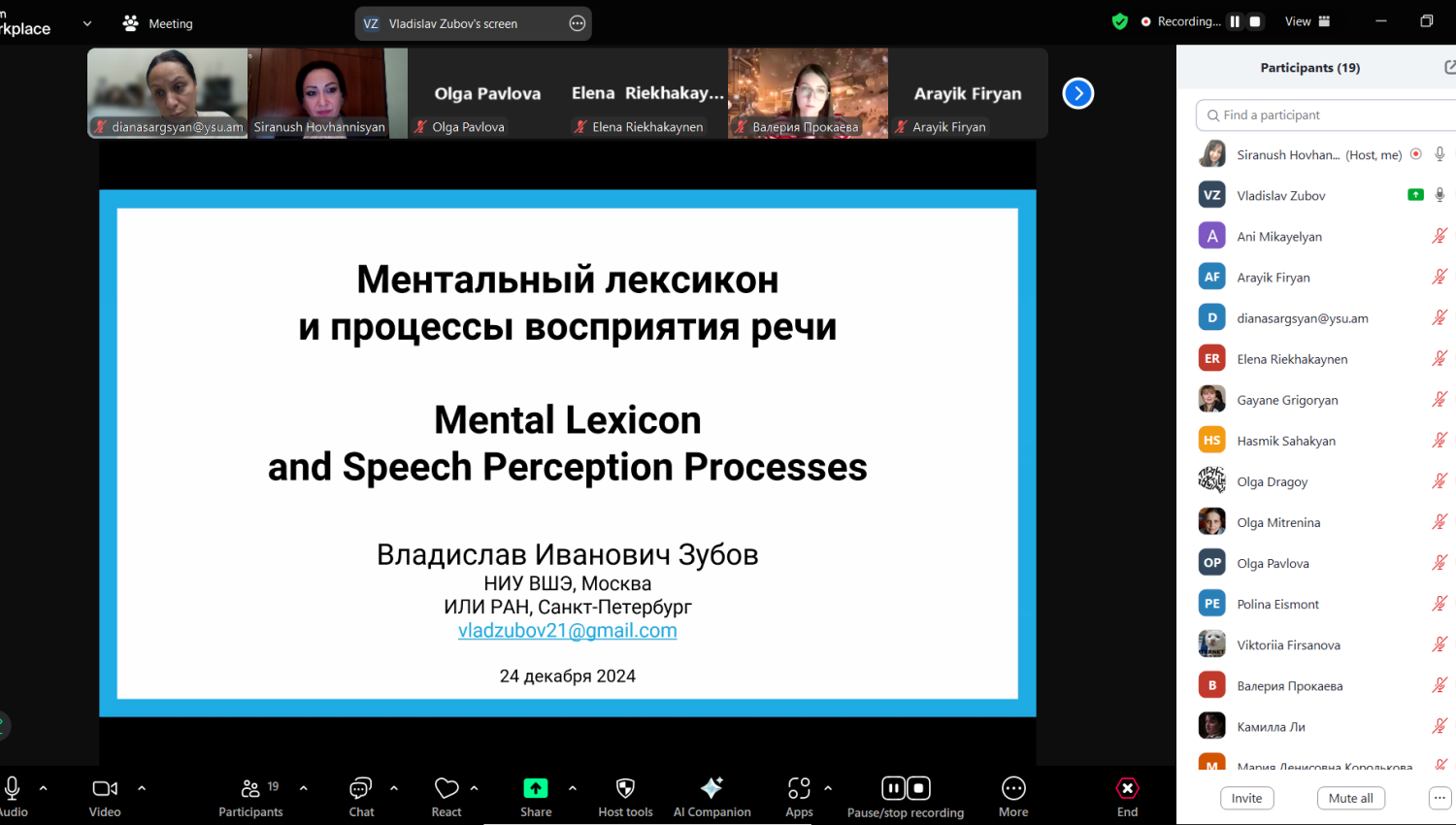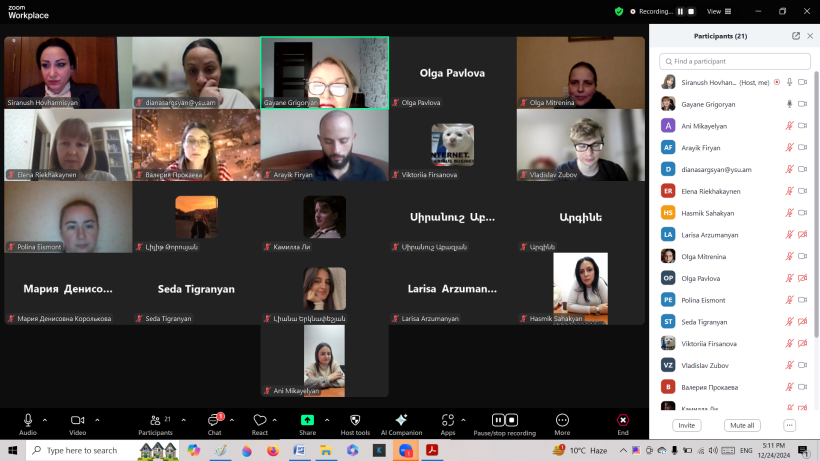- Main
- News and events
- Participation of YSU Ijevan branch students in the international neuropsycholinguistics conference
Ijevan Branch of YSU
Միջազգային

On December 24 students of the YSU IB “Armenian Language and Literature” educational program participated in the international online conference on neuropsycholinguistics organized by the initiative of the Department of Applied Linguistics of the H. Acharyan Institute of Language of the NAS RA (“International Conference on Problems of Applied Linguistics: Neurolinguistics, Psycholinguistics”). The agenda included 4 neuropsycholinguistic issues: “Applied Linguistics and Modern Technologies: Artificial Intelligence” (Прикладная лингвистика и современные технологии: искусственный интеллект), “Modern Problems of Neurolinguistics: Restoration of Linguistic Thinking through Language Tests” (Актуальные проблемы нейролингвистики: восстановление языкового мышления с помощью языковых тестов), “Predictions of the Development of Psycholinguistics. "Prognosis of the development of psycholinguistics: on the threshold of the second half of the XXI century" (Prognosis of the development of psycholinguistics: on the threshold of the second half of the XXI century), "Field methods in linguistic and interdisciplinary research" (Field methods in linguistic and interdisciplinary research (dialectology, colloquial speech).
Խորհրդակցությունը նախագահում էր ԵՊՀ ԻՄ հայոց լեզվի և գրականության ամբիոնի ասիստենտ, բ.գ.թ. Ս. Հովհաննիսյանը, իսկ միջոցառման համանախագահն էր ՌԴ Սանկտ-Պետերբուրգի համալսարանի Լ. Վերբիցկայի անվան ընդհանուր լեզվաբանության ամբիոնի վարիչ Ե. Ռիեխակայնենը: Հանդիպմանը մասնակցում էին ՀՀ ԳԱԱ լեզվի ինստիտուտի, փորձաքննությունների ազգային բյուրոյի, ԵՊՀ, ԵՊԲՀ, Սանկտ-Պետերբուրգի համալսարանի, ՌԴ գիտությունների ակադեմիայի, ՌԴ լեզվի և ուղեղի կենտրոնի ներկայացուցիչները:
Շուրջ 3 ժամ տևած հանդիպման ընթացքում հնչեցին մասնագիտական հաղորդումներ ոլորտի առաջատար մասնագետների կողմից (Օ. Միտրենինա, Ե. Ռիեխակայնեն, Օ. Դրագոյ, Վ. Զուբով, Պ. Էյսմոնտ, Մ. Կորոլկովա): Մասնագետները քննարկեցին մի շարք կարևոր և հրատապ խնդիրներ, ինչպիսիք են՝ բնական լեզվի և հուզական ինտելեկտի՝ արհեստական բանականության կողմից վերարտադրումը և մշակումը, վերբալ և ոչ վերբալ տեքստերի ընկալումը, լեզվական միավորների ընկալման և վերլուծության մեխանիզմները հատկապես լեզվամտածողության պաթոլոգիաների դեպքում, ընդարձակ զեկուցում ներկայացվեց հոգելեզվաբանության ժամանակակից մեթոդների վերաբերյալ: Առանձնահատուկ ուշագրավ էր տեքստի ուսումնասիրության ուղղությունների վերաբերյալ քննարկումը, ինչպես նաև երկխոսության փոխազդեցության հետազոտության մասին հաղորդումը: Խորհրդակցության էր դրված նաև մենթալ բառապաշարի և խոսքի ընկալման գործընթացների վերաբերյալ գործնական դիտարկումը: Դաշտային աշխատանքներին նվիրված մասում հնչեցին հաղորդումներ ժամանակակից բարբառագիտության մեջ դաշտային մեթոդի կիրառության, էմպիրիկ նյութի հավաքման խնդիրների վերաբերյալ, և այս մասում ընդգծելի էր խոսակցական լեզվի բազմամակարդակ բնութագրի կազմության և բանավոր խոսքի կորպուսների ստեղծման վերաբերյալ հաղորդումը:

The consultation was chaired by the Assistant Professor of the Department of Armenian Language and Literature of the Yerevan State University, PhD S. Hovhannisyan, and the co-chair of the event was the Head of the Department of General Linguistics named after L. Verbitskaya of the Saint Petersburg University of the Russian Federation E. Riekhakainen. The meeting was attended by representatives of the Institute of Language of the RA NAS, the National Bureau of Expertise, YSU, YSMU, Saint Petersburg University, the Russian Academy of Sciences, the Russian Center for Language and Brain.
During the meeting, which lasted about 3 hours, professional reports were made by leading specialists in the field (O. Mitrenina, E. Riekhakainen, O. Dragoi, V. Zubov, P. Eismont, M. Korolkova). The specialists discussed a number of important and urgent issues, such as the reproduction and processing of natural language and emotional intelligence by artificial intelligence, the perception of verbal and non-verbal texts, the mechanisms of perception and analysis of linguistic units, especially in the case of pathologies of linguistic thinking, an extensive report was presented on modern methods of psycholinguistics. Of particular note was the discussion on the directions of text study, as well as the report on the study of dialogue interaction. The consultation also put forward practical observations on the processes of mental vocabulary and speech perception. In the part dedicated to field work, reports were made on the application of the field method in modern dialectology, the problems of collecting empirical material. In this part, the report on the composition of a multi-level characteristic of spoken language and the creation of oral speech corpora was noteworthy.
S. Hovhannisyan presented the LexTale language proficiency test based on Armenian-German joint work and the German language parallel database and its development prospects, with a special interest in Armenian and within the framework of Russian partners, on starting a new study.
In the first part of the consultation, the question raised by L. Torosyan, a graduate student of the “Armenian Language and Literature” educational program of the Ijevan branch of YSU, which was aimed at the unpredictability of emotions, can you predict the powerful emotions of a robot operating on the basis of pre-installed emotions, the specialist presenting the programs is extensive. with an explanation substantiated how the robot generates new emotions based on emotions.
The consultation ended with an exchange of opinions between the two sides, clear proposals for cooperation and the expectation of a new event.
Spread the article